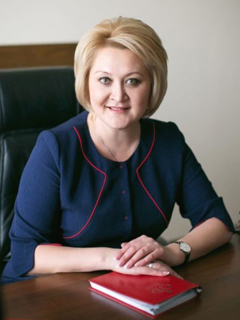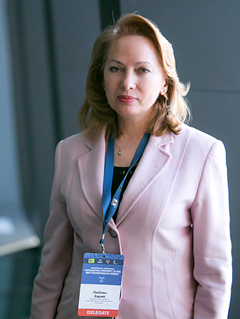World Intellectual Property Day: WRO Interviews Leading Russian Women
April 26, 2018
For World Intellectual Property Day 2018 we spoke to Senator Lilia Gumerova, First Deputy Chair of the Federation Council Committee on Science, Education and Culture, and Ms. Liubov Kiriy, Deputy Director General of Rospatent about women in innovation and creativity.
Interview with Senator Lilia Gumerova
Why is it important to encourage greater participation by women in innovation and creativity?
The theme chosen by WIPO this year – Powering change: Women in innovation and creativity – is in line with the growing demand in society for more active participation by women in sociopolitical and economic processes.

Council (Russia))
Today women play a vital role in all spheres of life and society, they are actively making their presence felt in politics and economics, science and technology, education, culture, and the arts.
Women are different in terms of their approach to work and their interests, they are more thorough and persistent in doing research, they are sensitive to what is new and they are open to cooperation, and therefore they bring different perspectives to science. Broad participation by women in the formation of the global intellectual property market and in the creation of a favorable legal framework for the development of advanced technologies is dictated by the times and by the needs of society.
What is the role of IP rights in supporting inventors and creators in monetizing their work and in bringing it to market?
They have a huge role! Fostering the most favorable environment possible for commercialization of innovations in scientific research, technology, and other fields is a vital task today. At the same time, it is important not only to put into place effective legal mechanisms; integrated development of the entire system of social, organizational, and economic relationships in the creation and commercialization of intellectual property is needed as well. What we are also talking about here is the creation of a sociocultural environment that gives rise to innovations and new ideas, stimulating in people the desire not only to invent things, but also to earn money from their own inventions, and to find practical applications for new technologies.
And above all, the system to support inventors should be organized in such a way that all of our scientists’ developments and scientific research have an opportunity to get launched into the world. Our future and our prosperity depend on the extent to which an effective legal framework is created for the use of intellectual property in the country’s economy.
What advice do you have for girls/young women with aspirations to engage in innovation, creativity, business, etc.?
A great deal is being done today to enable women to realize their full potential both at home and at work, the necessary conditions are being created. I would encourage every woman who is preparing to take an important step in her life to act with more boldness, sincerity, and courage in her chosen arena – be it politics, economics, science, production, or another field.
In addition, it is important for a woman to be able to combine a scientific career with motherhood and having a family. After all, the most important, central concepts for women are family, love, motherhood, children, and peaceful skies overhead.
By contributing to the maintenance of peace, harmony, and social well-being, women are giving society a new direction for development, and they are forcing the world to change for the better.
Interview with Liubov Kiriy
Why is it important to encourage greater participation by women in innovation and creativity?
UNESCO statistical data indicate that there is a gender imbalance: women, who represent half of humanity, account for just 28 percent of the world’s scientists. The number of Nobel laureates who are women remains extremely small – just eight women have been awarded this prestigious prize since 2010.

In my view, the gender imbalance problem is not as acute in the Russian Federation as it is in some other countries. As things stand today, Russian innovators, both men and women, enjoy equal opportunities to realize their creative potential.
There is no question that encouraging greater participation by women in innovation will have a significant positive impact. After all, women innovators can bring their own particular perspective to research and investigative work, and they can draw on their creative intuition and persistence to arrive at unconventional solutions.
I am pleased to note that women inventors are actively making their presence felt, and we can take pride in their outstanding accomplishments. For example, more than a third of the inventions on Russia’s list of the top 100 inventions of 2017, which was prepared by the Russian Patent Office, were created with the participation of women.
In 2017 Russian researchers saw growth in the proportion of women with a candidate of sciences or doctor of sciences degree (rising to 24 percent and 16 percent, respectively). This points to a high level of interest among Russian women in a scientific career, which is inextricably linked to intellectual property.
It is difficult to evaluate women’s contribution to the development of innovations using statistical data – after all, they are responsible for bringing up new generations of inventors and passing on to them the rich legacy and achievements of human thought. We are collaborating with a large number of talented and active women who are working on projects to develop a system for identifying gifted children and supporting their scientific and technical creativity. In the process of implementing its own projects, the Russian Patent Office sees the substantial contribution of women to initiating children into the world of innovation and training personnel from a young age.
It is also worth noting that innovations require integrated support from a large number of specialists – lawyers, patent officials, and experts. There are many women working in all of these professions in Russia. For example, the Federal Industrial Property Institute, which performs examinations of industrial property, employs 716 women as experts, accounting for almost 74 percent of the total number of experts on staff.
I am confident that women’s potential in the development of innovations is far from being exhausted, and major achievements are still to come.
What is the role of IP rights in supporting inventors and creators in monetizing their work and in bringing it to market?
The system of intellectual property protection arose out of the need to safeguard the rights and interests of creators, to encourage their creativity, and to promote the progress of society. Creating the conditions not only for creativity, but also for the practical application of inventions and the publication of works – this is one of the most important tasks of the state, since it promotes economic development.
We are living in an era of extraordinarily rapid development of science and technology. Intangible assets are taking on more and more significance for the successful development of organizations and businesses.
The role of intellectual property in the contemporary world is growing, evidence of which can be seen in the patent statistics of those countries whose economies are experiencing rapid development. It is important in this process to create incentives for the authors of intellectual property to engage in further creative work by ensuring that they receive proper remuneration, both for the creation of this property and for participation in its commercialization.
What advice do you have for girls/young women with aspirations to engage in innovation, creativity, business, etc.?
I can say with confidence that in our country all of the conditions have been created for women to realize their potential in any sphere that they choose.
Therefore, there’s no need to shy away from ambitious goals – they make it possible to stretch the boundaries of your possibilities, to learn something new about the world and about yourself, and to realize your potential in creativity, innovation, or business.